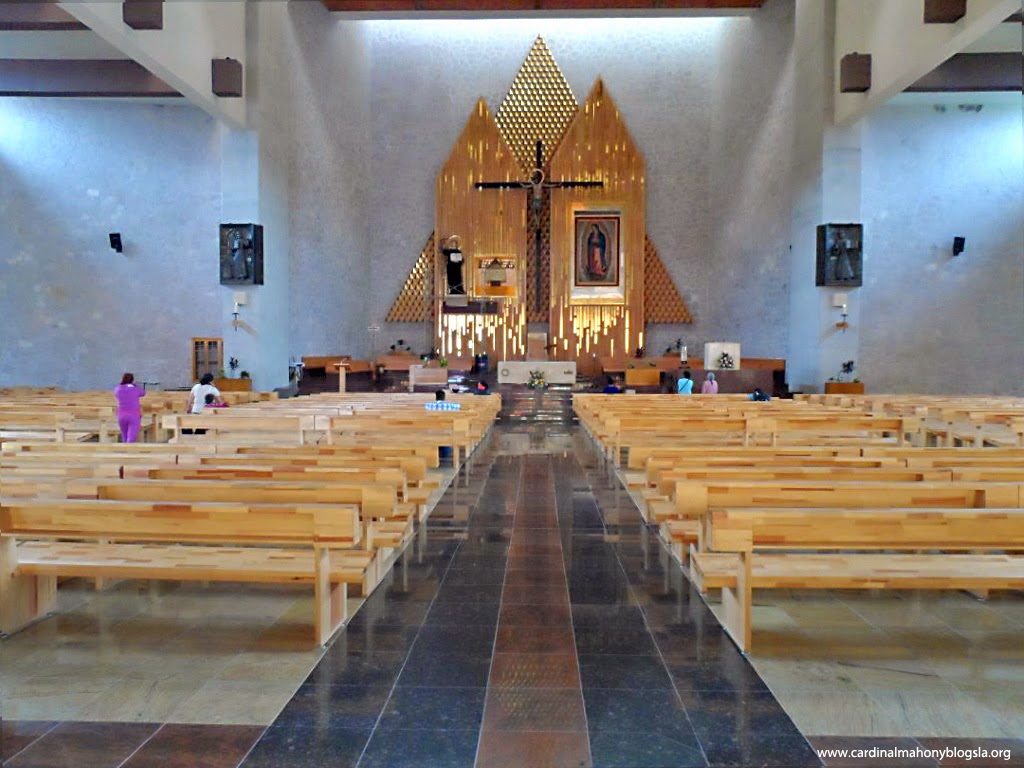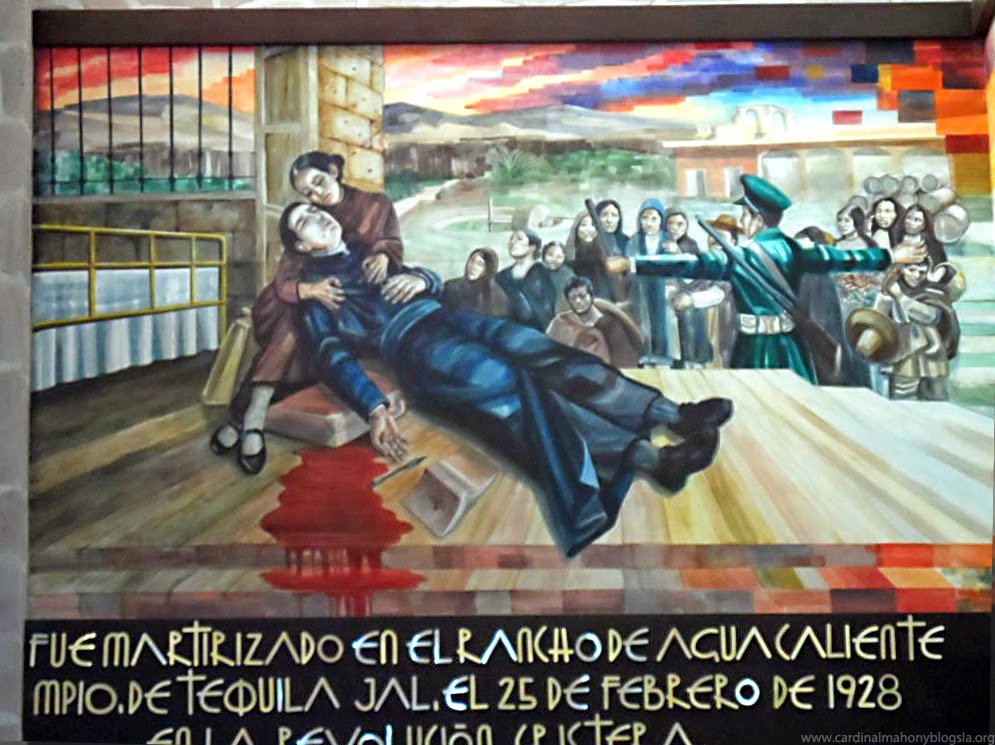I was recently privileged to share some impressions on the difficulties facing the immigrants among us in L'Osservatore Romano, the Vatican's daily newspaper. Since the article was published in Italian, the following is my original draft in English.
On her feast and always, may America’s presence of Mary, our Mother Guadalupe, guide and help our Church as week seek to serve her children. ¡Virgen de Guadalupe, ruega por nosotros!
_____________
“The American Dream”
Cardinal Roger M. Mahony
Archbishop-emeritus of Los Angeles
Over recent days, the United States Senate heard the moving story of a young man named Rey Piñeda. Born in Mexico, Rey came with his family to the United States at age 2. Because of his status as an undocumented immigrant, he was prevented from fulfilling his hopes for an education and pursuing his life’s ideals, until the 2012 introduction of the national Deferred Action for Childhood Arrival (DACA) program, which has provided him and close to 770,000 other young people protection from deportation and allowing them authorization to work.
While President-elect Donald J. Trump has pledged to implement several severe immigration policies, including the deportation of 11 million undocumented immigrants and the construction of a wall on the Mexican border, the most pressing and imminent challenge his incoming Administration presents on this critical issue is its promise to rescind the DACA program.
 |
| Fr. Rey Piñeda |
Known as the “DREAMers,” these young people in their teens and 20s were brought to the U.S. by their parents as young children, unaware of any laws or documents, only knowing and seeking to be with their families. More than being bright and talented contributors to this nation, they are our future leaders, even in the Church: even today, they are already Americans in everything but citizenship.
According to a study by the Center for Migration Studies of New York, the DREAMers are deeply embedded in U.S. society. Eighty-five percent have lived in the United States for ten years or more. Ninety-three percent have at least a high school degree, with forty-three percent having attended college or graduated from college. Eighty-nine percent are employed – and thus pay taxes – while ninety-one percent speak English very well or exclusively.
To remove protections from this group is not only mean-spirited, but a foolish act of self-sabotage to both the national interest and the values which have always made this country great. Today, as it has been since our nation’s founding, the promise and common good of this nation is best served when we support hard-working, intelligent young people, and give them the means to flourish. It is in this tradition that preserving DACA is our only sane, moral and truly American way forward.
Unlike the Border wall and several other aspects of his immigration proposals, upon the moment he assumes office next month, President-elect Trump will be able to eliminate the DACA program with the stroke of a pen. He will, however, find that removing these young people will not be so easy. I believe that the American people will not allow it, both in terms of public opinion and in active resistance.
In other words, I believe Americans will not cooperate with Mr. Trump's Administration on implementing mass deportations, most especially the deportation of young immigrants. These DREAMers are now part of our social fabric—we see them everyday in our neighborhoods, workplaces, and schools. They have forged bonds with U.S. citizens who know them as people, not a "status" or piece of paperwork. They are contributing their energies to this country, and have fought for their God-given rights and their place at our national table. Some serve in the U.S. military, others in education or health-care, yet regardless of their chosen profession, the DREAMers show us that the “American dream” is alive and well in their hands.
Should President-elect Trump move to eliminate DACA, calls have already emerged for churches and communities to protect them by not cooperating with immigration enforcement and by providing sanctuary for those likely to be affected. I add my voice to that call, and I am particularly gratified to be joined by a growing number of my brother bishops, as well as nearly 100 of the presidents of our nation’s Catholic colleges and universities, who have spoken up in support of these sisters and brothers of ours.
Pope Francis captures the spirit and heart of what we seek to say. “Migrants and refugees are not pawns on the chessboard of humanity,” he wrote in 2014. “They are children, women, and men who leave their homes for various reasons, who share a legitimate desire for knowing and being, but above all being more.”
Still closer to home, on his visit last year to our nation’s very birthplace at Independence Hall in Philadelphia, the Holy Father expressed his “particular affection” for the U.S.’ latest generation of new arrivals, urging them to “not be discouraged by whatever challenges and hardships you face.
“You bring many gifts to your new nation,” the Pope told today's migrants among us, encouraging them to “never be ashamed of your traditions… which are something you can bring to enrich the life of this American land.”
After an election campaign which has exposed bitter divides among our people and, sadly, unearthed sicknesses in our society that many thought were left in the past, advocating for policies like DACA and those it benefits is just one part of the challenge we face as a Church.
On one side, the fear and anxiety which have gripped our immigrant communities in these days isn’t simply real, but currently running as deep as many of us who serve among them have ever seen. Even more, however, as citizens committed to the common good and pastors who seek to serve and imitate the Lord Jesus, one of the harrowing lessons this campaign season has shown us is the degree to which many people who profess to be Christian, and even Catholic, have succumbed to the “throwaway culture,” both in our national discourse and in the policies they deemed acceptable to support.
While it is true that the current political environment of the U.S. has made many of our faithful feel “politically homeless,” I fear that many Christians, among them more than a few Catholics, have somehow become misled about the demands of the Gospel regarding how we treat our neighbor, or how we answer the very question of “Who is our neighbor?” Much as we have sought to be prophetic witnesses to Christ and His teaching in and out of season, the new political reality places a particular burden upon our ministry as shepherds: in word and example, to express ever more powerfully to our people that the commission to serve “the least of these” is not an ideological proposal that one may see as disposable but, as Pope Francis has so frequently described it, “the protocol by which we,” as Christians, “will be judged.”
As Dr. Martin Luther King, Jr. once wrote, “Injustice anywhere is a threat to justice everywhere.” The threat of deporting young people to a country they do not know, or the prospect that the Church’s efforts on behalf of immigrants could face civil intimidation or attempts at closure, raise the specter of an injustice that would threaten all of us, flying in the face of fairness and human decency, not to mention the very same Gospel which inspired Dr King’s movement for civil rights. Even the possibility of these dangers would gravely weaken our communities and diminish us as a nation. In these days, then, let us pray for the courage, wisdom and fidelity to serve our moment’s “suffering flesh of Christ” among us, in the confident faith that what we do for them, we have done for Him.
Later this month, our immigrant families will gather again at the feet of their beloved Mother as we celebrate the feast of Our Lady of Guadalupe. May la Virgen Morena, Patroness of this one American land, intercede for her children and our entire society, that our service and witness on behalf of her Son’s “least ones” may bring about a new spirit of reconciliation, liberty and justice for all.

















